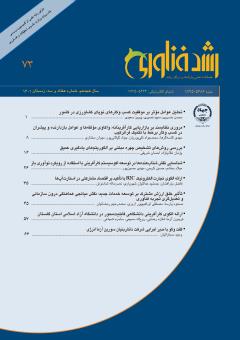طراحی الگوی کارآفرینی دانشگاهی قابلیت محور در دانشگاه آزاد اسلامی استان گلستان
محورهای موضوعی : Entrepreneurship and Innovation Ecosystemsفریدون آزما 1 , فائزه رضایی 2 , روح اله سمیعی 3 , سامره شجاعی 4
1 - گروه مدیریت، واحد علیآباد کتول، دانشگاه آزاد اسلامی، علیآباد کتول، ایران.
2 - دانشجوی دکتری، رشته کارآفرینی، گروه مدیریت، واحد علیآباد کتول، دانشگاه آزاد اسلامی، علیآباد کتول، ایران
3 - گروه مدیریت، واحد علیآباد کتول، دانشگاه آزاد اسلامی، علیآباد کتول، ایران
4 - دانشگاه آزاد اسلامی، علیآباد کتول، ایران
کلید واژه: کسبوکار, اشتغال, فناوری, نظريه دادهبنياد,
چکیده مقاله :
امروزه بیکاری فارغالتحصیلان دانشگاهی یکی از دغدغههای دولت است که کلید حل آن در دانشگاهها میباشد. از این رو هدف این پژوهش ارائه الگوی کارآفرینی دانشگاهی قابلیت محور بود. این پژوهش کیفی و مبتنی بر نظریه دادهبنیاد میباشد. مشارکتکنندگان در پژوهش شامل خبرگان دانشگاهی حوزه کارآفرینی بودند که به روش هدفمند انتخاب گردیدند. دادههای پژوهش از طریق مصاحبه عمیق جمعآوری گردید که در مصاحبه 15ام اشباع نظری حاصل گردید. متن مصاحبهها طی سه مرحله کدگذاری باز، محوری و انتخابی تحلیل شد. برای بررسی اعتبار یافتهها اقدامات درگیري طولانی مدت و مشاهده مداوم، بازبینی توسط مشاركتكنندگان، بررسي همكار و تکنیک مثلثسازي انجام گرفت و براي ارزيابي قابل اتكا بودن از معيار قابليت اعتبار، انتقالپذيري، اتكاپذيري و تأييدپذيري استفاده شد. یافتههای پژوهش نشان داد شرايط علّي شامل عوامل ساختاری، عوامل نوآورانه، عوامل حمایتی و عوامل محیطی؛ شرایط مداخلهگر شامل سیاستگذاری، وابستگی دانشگاه به منابع مالی و دسترسی به بازار بینالملل؛ شرایط زمینهای شامل ارتقاء زیرساختها در دانشگاه، توسعه چشمانداز سیستمی کارآفرینی دانشگاهی، زمینهسازی فرصتهای کارآفرینانه، توزیع بهینه منابع مالی براي انجام کسبوکار و زمینهسازی فرآيند تحقیقات و تجاریسازی در دانشگاه میباشد. راهبردها شامل تدوین چشمانداز فعالیتهای کارآفرینانه، تلفیق دانش تئوریک و دانش تجربی مرتبط با کارآفرینی، تعامل مناسب میان دانشگاه و صنعت، تدارک استانداردهاي کارآفرینانه توسط برنامههای بلندمدت و ایجاد دفتر اخذ مجوز فناوری منجر به پیامدها شامل بهبود تجاریسازی یافتههای دانشگاهی، ایجاد مراکز رشد و فناور، اشتغالزایی مبتنی بر روحیه کارآفرینی، رشد فعالیتهای کسبوکار دانشمحور و نهادینه شدن روحیه کارآفرینی در بین مدیران، کارکنان، دانشجویان و استادان میشود.
Today, unemployment of university graduates is one of the concerns of the government, the key to solve which is in universities. This study aimed to present a model of capability-based university entrepreneurship. This research is qualitative and based on Grounded Theory. Participants included academic experts in field of entrepreneurship selected purposefully. Research data were collected through in-depth that reached theoretical saturation in the 15th interview. Interviews were analyzed in three stages of open, axial and selective coding. To validate the findings, long-term engagement measures and continuous observation, review by participants, peer review and triangulation technique were performed and to assess reliability, the criteria of reliability, transferability, reliability and verification were used. Findings showed that causal conditions include structural, innovative, supportive and environmental factors; Intervening conditions include policy-making, university dependence on financial resources, and access to the international market; Context conditions include upgrading the infrastructure of the university, developing the vision of the university entrepreneurship system, contriving entrepreneurial opportunities, the optimal distribution of financial resources for doing business, and contriving the research and commercialization process at the university. Strategies include formulating a vision for entrepreneurial activities, combining theoretical and empirical knowledge related to entrepreneurship, proper interaction between university and industry, providing entrepreneurial standards by long-term plans, and establishing a technology licensing office which lead to consequences including improving the commercialization of academic findings, creating growth centers and technology, employment based on entrepreneurial spirit, the growth of knowledge-based business activities and the institutionalization of entrepreneurial spirit among managers, employees, students and professors.
